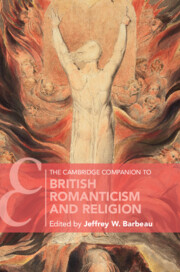Book contents
- The Cambridge Companion to British Romanticism and Religion
- The Cambridge Companion to British Romanticism and Religion
- Copyright page
- Contents
- Illustrations
- Contributors
- Acknowledgments
- Chapter 1 Introduction
- Part I Historical Developments
- Part II Literary Forms
- Part III Disciplinary Connections
- Chapter 14 Philosophy
- Chapter 15 Science
- Chapter 16 Politics
- Chapter 17 Music
- Chapter 18 Painting
- Index
- Cambridge Companions To …
- References
Chapter 14 - Philosophy
from Part III - Disciplinary Connections
Published online by Cambridge University Press: 01 October 2021
- The Cambridge Companion to British Romanticism and Religion
- The Cambridge Companion to British Romanticism and Religion
- Copyright page
- Contents
- Illustrations
- Contributors
- Acknowledgments
- Chapter 1 Introduction
- Part I Historical Developments
- Part II Literary Forms
- Part III Disciplinary Connections
- Chapter 14 Philosophy
- Chapter 15 Science
- Chapter 16 Politics
- Chapter 17 Music
- Chapter 18 Painting
- Index
- Cambridge Companions To …
- References
Summary
The empiricist legacy of John Locke developed in various directions in the British Romantic period, especially informing the movement known as theological utilitarianism, which taught ethics based on prudence and sought evidences for a benevolent, Christian God as designer of the world. This approach was challenged, however, above all by the idealism of Samuel Taylor Coleridge, who drew on Platonic and recent German sources. Further, newly translated Hindu texts influenced both metaphysical speculation and practical recommendations of a life of moderation and self-denial, including in the work of several female novelists in the period.
- Type
- Chapter
- Information
- The Cambridge Companion to British Romanticism and Religion , pp. 237 - 256Publisher: Cambridge University PressPrint publication year: 2021

